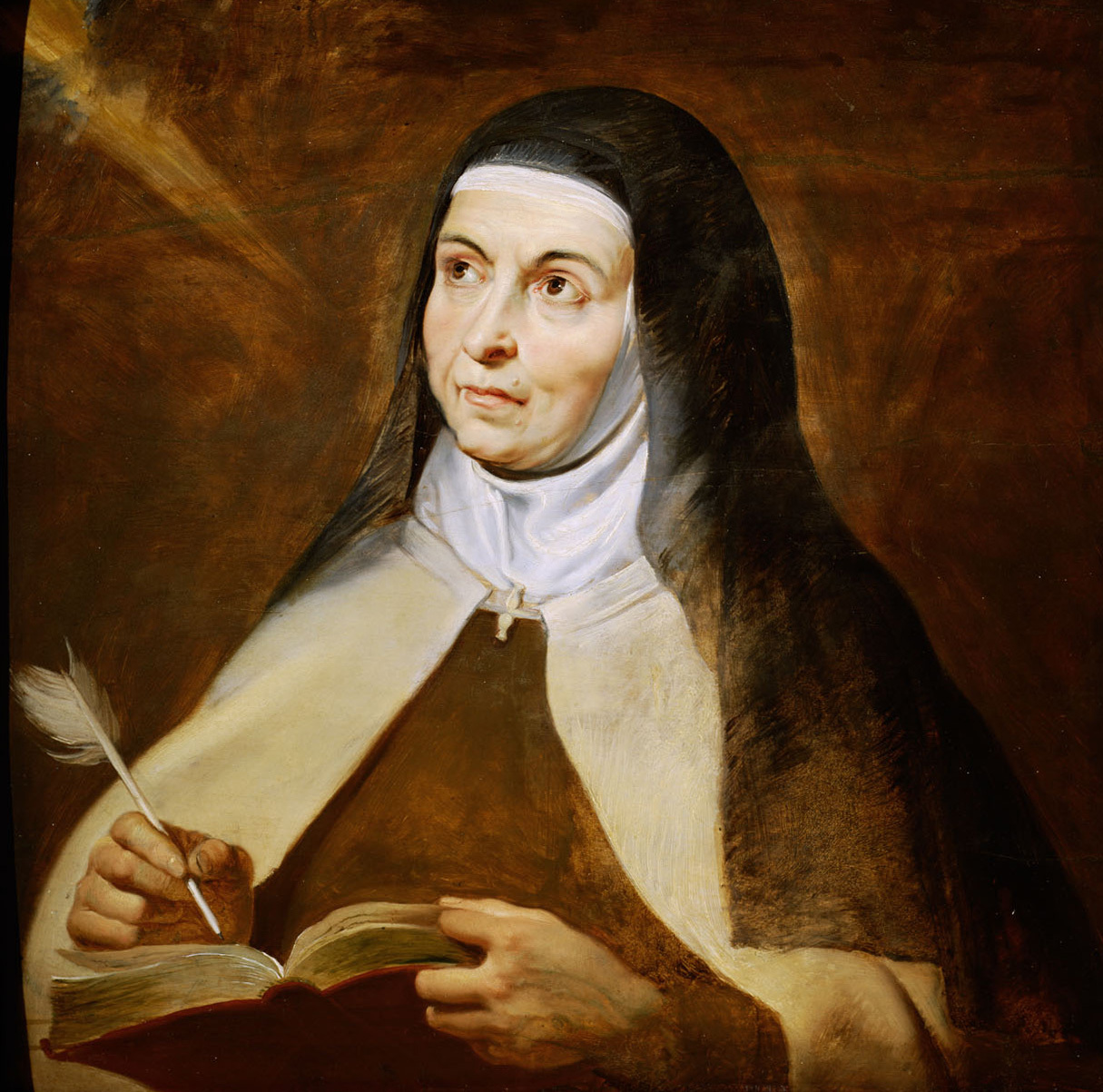Category Archives: weekly book
Protected: The 7 Habits of Highly Effective People | 3
Protected: The 7 Habits of Highly Effective People | 2
Protected: The 7 Habits of Highly Effective People | 1
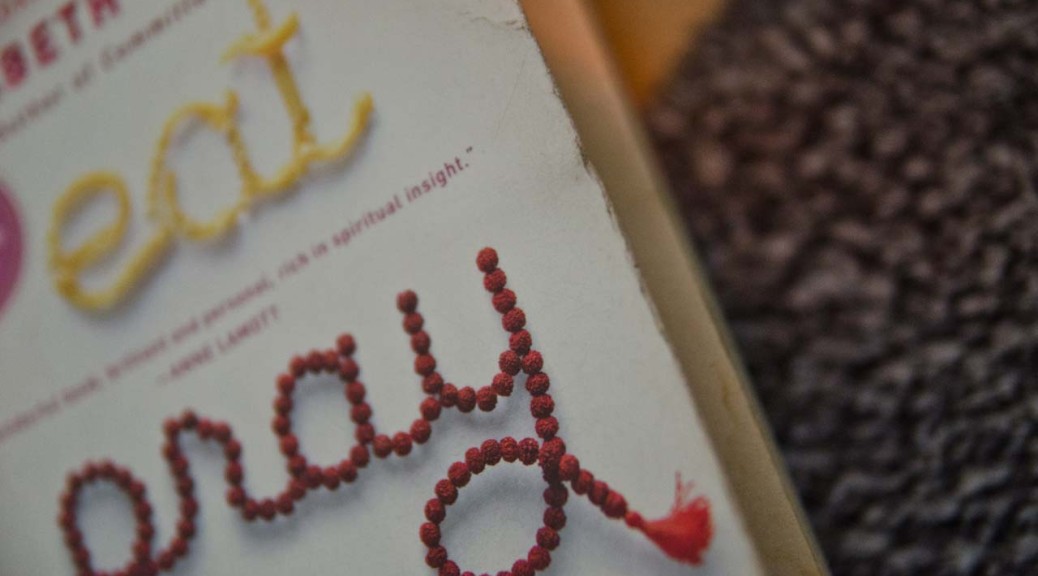
Eat Pray Love
Gilbert, Elizabeth. Eat, Pray, Love: One Woman’s Search for Everything Across Italy, India and Indonesia. New York, N.Y.; Penguin, 2007. Print. (First ed. 2006)
“When the Crusaders drove East for the holy wars, they witnessed worshipers praying with these japa malas, admired the technique, and brought the idea home to Europe as rosary.” p. 1
“the number 108 is held to be most auspicious, a perfect three-digit multiple of three, its components adding up to nine, which is three threes.” p. 1-2
“This division means that there are 36 tales in each section, which appeals to me on a personal level because I am writing all this during my thirty-sixth year.” p. 2
Om Namah Shivaya
“It wasn’t so much that I wanted to thoroughly explore the countries themselves; this has been done. It was more that I wanted to thoroughly explore one aspect of myself set against the backdrop of each country,” p. 37
“Therefore, what we today call French is really a version of medieval Parisian. Portuguese is really Lisboan. Spanish is essentially Madrileño. These were capitalist victories; the strongest city ultimately determined the language of the whole country.” p. 57
“What this congress decided would henceforth be considered proper Italian was the personal language of the great Florentine poet Dante Alighieri. When Dante published his Divine Comedy back in 1321, detailing a visionary progression through Hell, Purgatory and Heaven, he’d shocked the literate world by not writing in Latin.” p. 58-59
“He wrote his masterpiece in what he called il dolce stil nuovo, the “sweet new style” of the vernacular, and he shaped that vernacular even as he was writing it, affecting it as personally as Shakespeare would someday affect Elizabethan English.” p. 59
terza rima
“Dante writes that God is not merely a blinding vision of glorious light, but that He is, most of all, l’amor che move il sole e l’altre stelle… ” p, 60
il bel far niente “the beauty of doing nothing” p. 80
“For me, though, a major obstacle in my pursuit of pleasure was my ingrained sense of Puritan guilt. Do I really deserve this pleasure? This is very American, too–the insecurity about whether we have earned our happiness.”p. 81
“Dai, dai, dai, Albertini, dai … va bene, va bene, ragazzo mio, perfetto, bravo, bravo… Dai! Dai! Via! Via! Nella porta! Eccola, eccola, eccola, mio bravo ragazzo, caro mio, eccola, eccola, ecco–AAAHHHHHHHHH!!! VAFFANCULO!! FIGLIO DI MIGNOTTA!! STRONZO! CAFONE! TRADITORE! Madonna… Ah, Dio mio, perché, perché, perché, questo e stupido, e una vergogna, la vergogna… Che casino, che bordello… NON HAI UN CUORE, ALBERTINI! FAI FINTA! Guarda, non e successo niente.. Dai, dai, ah… Molto migliore, si si si, eccola, bello, bravo, anima mia, ah ottimo, eccola adesso … nella porta, nella porta, nell–VAFFANCULO!!!!!!!” p. 90-91
Augusteum
“The Augusteum warns me not to get attached to any obsolete ideas about who I am, what I represent, whom I belong to, or what function I may once have intended to serve… Even in the Eternal City, says the silent Augusteum, one must always be prepared for riotous and endless waves of transformation.” p. 100
magari (maybe, if only, I wish)
History of the Decline and Fall of the Roman Empire by Edward Gibbon
“Parla come magni.” p. 115
“Virginia Woolf wrote, “Across the broad continent of a woman’s life falls the shadow of a sword.” On one side of that sword, she said, there lies convention and tradition and order, where “all is correct.” But on the other side of that sword, if you’re crazy enough to cross it and choose a life that does not follow convention, “all is confusion. Nothing follows a regular course.”” p. 126
The Bhagavad Gita–that ancient Indian Yogic text–says that it is better to live your own destiny imperfectly than to live an imitation of somebody else’s life with perfection.” p. 127
“I drop out of my Italian-language school, having come to feel that it was interfering with my efforts to learn Italian, since it was keeping me stuck in the classroom instead of wandering around Italy, where I could practice with people in person.” p. 128
codega “a fellow you hired to walk in front of you at night with a lit lantern, showing you the way, scaring off thieves and demons, bringing you confidence and protection through the dark streets.” p. 135
“Or maybe I only want to go to Sicily because of what Goethe said: “Without seeing Sicily one cannot get a clear idea of what Italy is.”” p. 148
“Historians say that rhetoric was invented in Syracuse, and also (and this is just a minor thing) plot.” p. 150
The Italians (1964) by Luigi Barzini
“In a world of disorder and disaster and fraud, sometimes only beauty can be trusted. Only artistic excellence is incorruptible.” p. 152
“You were given life; it is your duty (and also your entitlement as a human being) to find something beautiful within life, no matter how slight.” p. 154
arati prayer
“Greek stoic philosopher Epictetus: “You bear God within you, poor wretched, and you know it not.”” p. 161
To Read: Epictetus
“”Our whole business therefore in this life,” wrote Saint Augustine, rather Yogically, “is to restore to health the eye of the heart whereby God may be seen.”” p. 162
To Read: Saint Augustine
“the monk quoted to me from the Bhagavad Gita, the most sacred ancient text of Yoga: “Oh Khrisna, the mind is restless, turbulent, strong and unyielding. I consider it as difficult to subdue as the wind.”” p. 174
Ham-sa mantra
Saint Teresa of Avila
“The most difficult challenge, the saint wrote in her memoirs, was to not stir up the intellect during meditation, for any thoughts of the mind–even the most fervent prayers–will extinguish the fire of God.” p. 190
kundalini shakti
“You gotta stop wearing your wishbone where your backbone oughtta be.” p. 199
guru gita
“Zen masters always say that you cannot see your reflection in running water, only in still water.” p. 226
Vipassana meditation
“”The world is afflicted with death and decay, therefore the wise do not grieve, knowing the terms of the world,” says an old Buddhist teaching.” p. 229
“Half the benefit of prayer is in the asking itself, in the offering of a clearly posed and well-considered intention.” p. 235
“Because if you can’t learn to master your thinking, you’re in deep trouble forever.” p. 236
“”Guilt’s just your ego’s way of tricking you into thinking that you’re making moral progress.”” p. 244
(Instructions for Freedom) “3. The day is ending. It’s time for something that was beautiful to turn into something else that is beautiful. Now, let go.” p. 245
“7. Let your intentions be freedom from useless suffering. Then, let go.” p. 246
“the rules of transcendence insist that you will not advance even one inch closer to divinity as long as you cling to even one last seductive thread of blame.” p. 247
“To know God, you need only to renounce one thing–your sense of division from God.” p. 255
Sextus “”The wise man is always similar to himself.” p. 256
Sentences of Sextus
turiya state (pure consciousness)
“We search for happiness everywhere, but we are like Tolstoy’s fabled beggar who spent his life sitting on a pot of gold, begging for pennies from every passerby, unaware that his fortune was right under him the whole time. Your treasure–your perfection–is within you already. But claim it,” p. 262
“”All know that the drop merges into the coean, but few know that the ocean merges into the drop,” wrote the sage Kabir” p. 265
To Read: Kabir
“”Imagine that the universe is a great spinning engine,” he said. “You want to stay near the core of the thing–right in the hub of the wheel–not out at the edges where all the wild whirling takes place,” p. 275
“In the dead of night the dogs howl about how misunderstood they are.” p. 312
“The word paradise, by the way, which comes to us from the Persian, means literally “a walled garden.”” p. 313
“The next piece of land was rejected because it was too close to a river, which, as everyone knows, is where ghosts live.” p. 411
“We get seduced by our own mantras (I’m a failure… I’m lonely…I’m a failure… I’m lonely…) and we become monuments to them.” p. 433
“Saint Anthony once wrote about having gone into the desert on silent retreat and being assaulted by all manner of visions–devils and angels, both… you can only tell which is which by the way you feel after the creature has left your company.” p. 435
To Read: Saint Anthony
Protected: the curious incident of the dog in the night-time
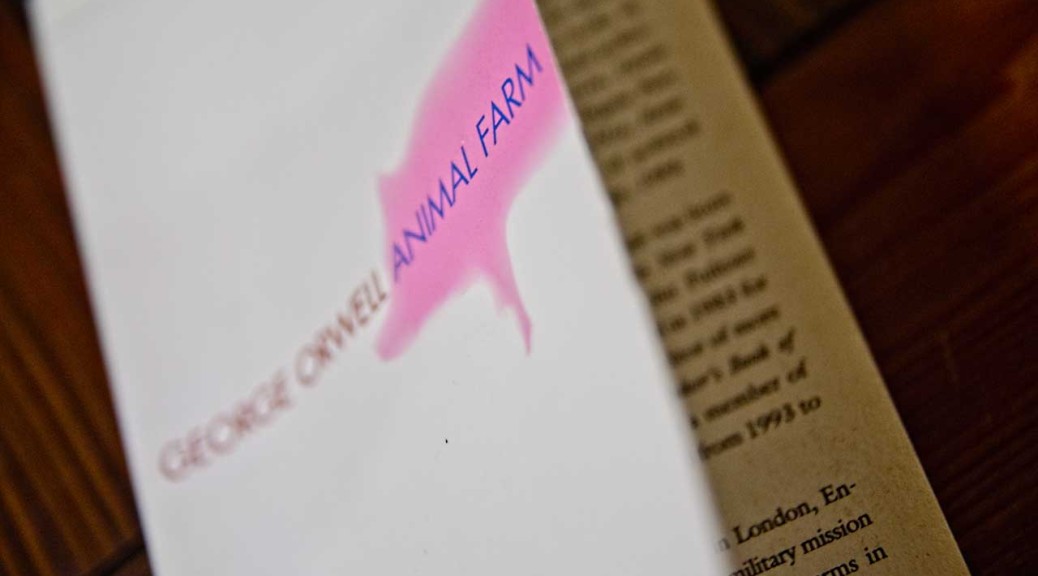
Animal Farm
Orwell, George. Animal Farm. New York, N.Y.: Signet Classics, 1996. Print. (First ed. 1945).
“Orwell called the book “a fairy story.” Like Voltaire’s Candide, however, with which it bears comparison, it is too many other things to be so handily classified.” p. vi
“Orwell started work on Animal Farm in 1943. As he discovered when he went looking for a publisher, Stalin’s Soviet Union was so popular that year in Britain and America that few wanted to hear or read anything critical of it.” p. viii
Orwell’s essay “”Politics and the English Language,” showing how politicians twist the language to distort and deceive.” p x
Candide by Voltaire
Darkness at Noon by Arthur Koestler
Brave New World by Aldous Huxley
Orwell and others “Why did they get it all wrong? For one thing, they were men who had come to maturity in the age of the dictators.” p. xiii
Rimsky-Korsakov‘s Le Coq d’Or “a fairy tale with a moral.” p. xxi
“The point about fairy-stories is that they are written not merely without a moral but without a morality. They take place in a world beyond good and evil, where people (or animals) suffer or prosper for reasons unconnected with ethical merit–for being ugly or beautiful respectively, for instance, or for even more unsatisfactory reasons.” p. xxii
“Moses, who was Mr. Jone’s especial pet, was a spy and a tale-bearer, but he was also a clever talker. He claimed to know of the existence of a mysterious country called Sugarcandy Mountain, to which all animals went when they died.” p. 17
“Some hams in the kitchen were taken out for burial,” p. 23
“A unanimous resolution was passed on the spot that the farmhouse should be preserved as a museum.” p. 23
“THE SEVEN COMMANDMENTS
1. Whatever goes upon two legs is an enemy.
2. Whatever goes upon four legs, or has wings is a friend.
3. No animal shall wear clothes.
4. No animal shall sleep in a bed.
5. No animal shall drink alcohol.
6. No animal shall kill any other animal.
7. All animals are equal.” p. 24-25
“The mechanical details came mostly from three books which had belonged to Mr. Jones–One Thousand Useful Things to Do About the House, Every Man His Own Bricklayer, and Electricity for Beginners.” p. 49
“But just at this moment Napoleon stood up and, casting a peculiar sidelong look at Snowball, uttered a high-pitched whimper of a kind no one had ever heard him utter before.
“At this there was a terrible baying sound outside, and nine enormous dogs wearing brass-studded collars came bounding into the barn.” p. 52-53
“”He fought bravely at the Battle of the Cowshed,” said somebody.
“Bravery is not enough,” said Squealer. “Loyalty and obedience are more important.” p. 55
“He was always referred to in formal style as “our Leader, Comrade Napoleon,” and the pigs liked to invent for him such titles as Father of All Animals, Terror of Mankind, Protector of the Sheep-fold, Ducklings’ Friend, and the like.” p. 93
“Squealer would talk with the tears rolling down his cheeks of Napoleon’s wisdom, the goodness of his heart, and the deep love he bore to all animals everywhere, even and especially the unhappy animals who still lived in ignorance and slavery on other farms.” p. 93
“By the evening of that day it was learned that he had instructed Whymper to purchase in Willingdon some booklets on brewing and distilling.” p. 108
“the retiring age had been fixed for horses and pigs at twelve, for cows at fourteen, for dogs at nine, for sheep at seven, and for hens and geese at five.” p. 112
“But the explanation was very simple. The van had previously been the property of the knacker, and had been bought by the veterinary surgeon, who had not yet painted the old name out. That was how the mistake had arisen.” p. 125
“No one stirred in the farmhouse before noon on the following day, and the word went round that from somewhere or other the pigs had acquired the money to buy themselves another case of whiskey.” p. 126
“Squealer was so fat that he could with difficulty see out of his eyes.” p. 128
“But the luxuries of which Snowball had once taught the animals to dream, the stalls with electric light and hot and cold water, and the three-day week, were no longer talked about. Napoleon had denounced such ideas as contrary to the spirit of Animalism. The truest happiness, he said, lay in working hard and living frugally.” p. 129
“neither pigs nor dogs produced any food by their own labour; and there were very many of them, and their appetites were always good.” p. 130
“Sometimes the older ones among them racked their dim memories and tried to determine whether in the early days of the Rebellion, when Jone’s expulsion was still recent, things had been better or worse than now. They could not remember. There was nothing with which they could compare their present lives: they had nothing to go upon except Squealer’s list of figures, which invariably demonstrated that everything was getting better and better.” p. 130
“She neighed again, and all the animals broke into a gallop and rushed into the yard. Then they saw what Clover had seen.
“It was a pig walking on his hind legs.” p. 132
“And finally there was a tremendous baying of dogs and a shrill crowing from the black cockerel, and out came Napoleon himself, majestically upright, casting haughty glances from side to side, and with his dogs gambolling round him.” p. 133
“There was nothing there now except a single Commandment. It ran:
ALL ANIMALS ARE EQUAL
BUT SOME ANIMALS ARE MORE EQUAL THAN OTHERS” p. 134
“He believed that he was right in saying that the lower animals on Animal Farm did more work and received less food than any animals in the country.” p. 137
“The creatures outside looked from pig to man, and from man to pig, and from pig to man again; but already it was impossible to say which was which.” p. 141
To Read:
Down and Out in Paris and London (1933) Novel
Burmese Days (1934) Novel
Homage to Catalonia (1938) Novel
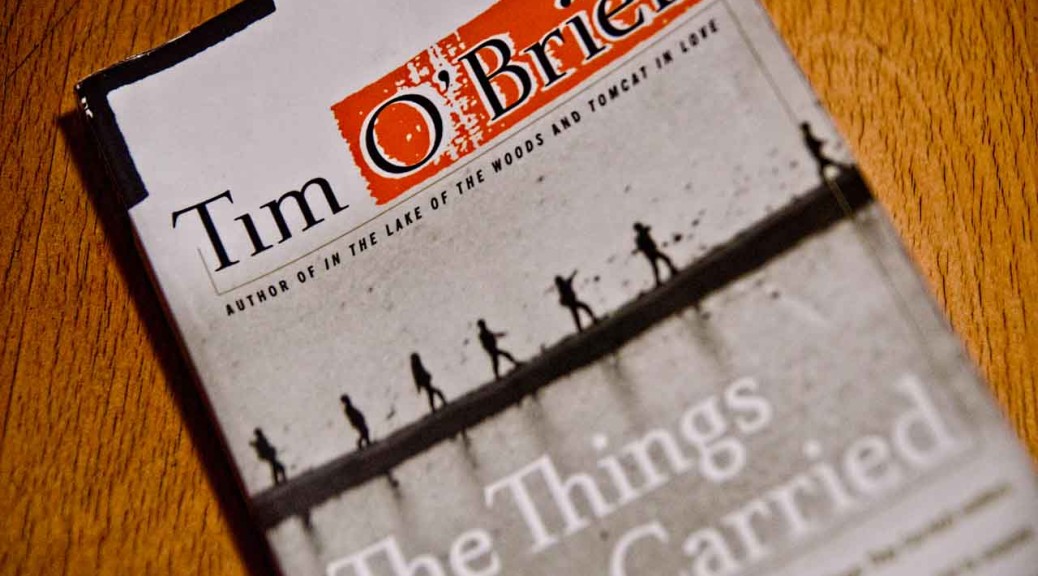
The Things They Carried
O’Brien, Tim. The Things They Carried. New York, N.Y.: Broadway Books, 1990. Print.
“He wondered how the tides and waves had come into play on that afternoon along the Jersey shoreline when Martha saw the pebble and bent down to rescue it from geology.” p8
“They would sit down or kneel, not facing the hole, listening to the ground beneath them, imagining cobwebs and ghosts, whatever was down there-the tunnel walls squeezing in” p. 10
“just sailing that big silver freedom bird over the mountains and oceans, over America, over the farms and great sleeping cities and cemeteries and highways” p. 23
“There were red checkers and black checkers. The playing field was laid out in a strict grid, no tunnels or mountains or jungles. You knew where you stood.” p. 32
“The old guy walked with a limp, slow and stooped over, but he knew where the safe spots were and where you had to be careful and where even if you were careful you could end up like popcorn.” p. 33
“Forty-three years old and I’m still writing war stories. My daughter Kathleen tells me it’s an obsession, that I should write about a little girl who finds a million dollars and spends it all on a Shetland pony.” p. 34
“That’s what stories are for. Stories are for joining the past to the future. Stories are for those late hours in the night when you can’t remember how you got from where you were to where you are. Stories are for eternity, when memory is erased, when there is nothing to remember except the story.” p. 38
“Courage, I seemed to think comes to us in finite quantities, like an inheritance, and by being frugal and stashing it away and letting it earn interest, we steadily increase our moral capital in preparation for that day when the account must be drawn down.” p. 40
USS Maddox at the Gulf of Tonkin. Tonkin Resolution.
Gulf of Tonkin incident
Rainy River, Minnesota/Ontario border.
“He was a witness, like God, or like the gods who look on in absolute silence as we live our lives, as we make our choices or fail to make them.” p. 60
“I was a coward. I went to the war.” p. 61
Chapter Enemies p.62-66
Chapter How to Tell a True War Story. 67-85
“A true war story is never moral. It does not instruct, nor encourage virtue, nor suggest models of proper human behavior, nor restrain men from doing the things men have always done. If a story seems moral, do not believe it.” p. 68
“Weird echoes and stuff. Like a radio or something, but it’s not a radio, it’s this strange gook music that comes right out of the rocks… They can’t get on the horn and call back to base and say, ‘Hey, listen, we need some firepower, we got to blow away this weirdo gook rock band.’ They can’t do that. It wouldn’t go down. So they lie there in the fog and keep their mouths shut.” p. 73
“The dark was coming on hard now, and off to the west I could see the mountains rising in silhouette, all the mysteries and unknowns.” p. 73
“It comes down to gut instinct. A true war story, if truly told, makes the stomach believe.” p. 78
On war: “It’s not pretty, exactly. It’s astonishing. It fills the eye. It commands you. You hate it, yes, but your eyes do not. Like a killer forest fire, like cancer under a microscope, any battle or bombing raid or artillery barrage has the aesthetic purity of absolute moral indifference–a powerful, implacable beauty–and a true war story will tell the truth about this, though the truth is ugly.” p. 81
“But what wakes me up twenty years later is Dave Jensen singing “Lemon Tree” as we threw down the parts.” p. 83
“Absolute occurrence is irrelevant. A thing may happen and be truer than total lie; another thing may not happen and be truer than the truth.” p. 83
“For Rat Kiley, I think facts were formed by sensation, not the other way around, and when you listened to one of his stories, you’d find yourself performing rapid calculations in your head, subtracting superlatives, figuring the square root of an absolute and then multiplying by maybe.” p89-90
Ruffs and Puffs: Regional Force / Popular Force
“The Greenies were not social animals. Animals, Rat said, but far from social.” p. 92
“Whenever he told the story, Rat had a tendency to stop now and then, interrupting the flow, inserting little clarifications or bits of analysis and personal opinion. It was a bad habit, Mitchell Sanders said, because all that matters is the raw material, the stuff itself, and you can’t clutter it up with your own half-baked commentary.” p. 106
“We all heard plenty of wackier stories. Some guy comes back from the bush, tells you he saw the Virgin Mary out there, she was riding a goddamn goose or something. Everybody buys it. Everybody smiles and asks how fast was they going, did she have spurs on.” p. 106
“And bones. Stacks of bones–all kinds. To one side, propped up against a wall, stood a poster in neat black lettering: ASSEMBLE YOUR OWN GOOK!! FREE SAMPLE KIT!!” p. 110
“But the grotesque part, he said, was her jewelry. At the girl’s throat was a necklace of human tongues. Elongated and narrow like pieces of blackened leather, the tongues were threaded along a length of copper wire, one overlapping the next, the tips curled upwards as if caught in a final shrill syllable.” p.110-111
“She had crossed to the other side. She was part of the land. She was wearing her culottes, her pink sweater, and a necklace of human tongues. She was dangerous. She was ready for the kill.” p. 116
Batangan Peninsula
“Sometimes, like that night in the shit field, the difference between courage and cowardice was something small and stupid.” p. 147
“Some of the men began shooting up flares. Red and green and silver flares, all colors, and the rain came down in Technicolor.” p. 148
“it occurred to me that the act of writing had led me through a swirl of memories that might otherwise have ended in paralysis or worse. By telling stories, you objectify your own experience. You separate it from yourself. You pin down certain truths. You make up others.” p. 158
“The rain made quick dents in the water, like tiny mouths, and the stink was everywhere.” p. 165
“The countryside itself seemed spooky–shadows and tunnels and incense burning in the dark. The land was haunted. We were fighting forces that did not obey the laws of twentieth-century science.” p. 202
“You don’t try to scare people in broad daylight. You wait. Because the darkness squeezes you inside yourself, you get cut off from the outside world, the imagination takes over.” p. 204
“It was a feeling VC must have. Like a puppeteer. Yank on the ropes, watch the silly wooden soldier jump and twitch.” p. 208
“The thing about a story is that you dream it as you tell it, hoping that others might then dream along with you, and in this way memory and imagination and language combine to make spirits in the head.” p. 230
The Man Who Never Was (film, dir. Ronald Neame, 1956) (Book by Lt. Cmdr. Ewen Montagu)
“But in a story I can steal her soul. I can revive, at least briefly, that which is absolute and unchanging.” p. 236
“We kept the dead alive with stories.” p. 239
There was a story for instance, about how Curt Lemon had gone truck-or-treating on Halloween. A dark, spooky night, and so Lemon put on a ghost mask and painted up his body all different colors and crept across a paddy to a sleeping village-almost stark naked, the story went, just boots and balls and an M-16-and in the dark Lemon went from hootch to hootch-ringing doorbells, he called it-and a few hours later, wen he slipped back into the perimeter, he had a whole sackful of goodies to share with his pals: candles and joss sticks and a pair of black pajamas and statuettes of the smiling Buddha.” p. 239
“To listen to the story, especially as Rat Kiley told it, you’d never know that Curt Lemon was dead. He was still out there in the dark, naked and painted up, trick-or-treating, sliding from hootch to hootch in that crazy white ghosts mask. But he was dead.” p. 240
**'”Well, right now,” she said, “I’m not dead. But when I am, it’s like … I don’t know, I guess it’s like being inside a book that nobody’s reading… An old one, It’s up on a library shelf, so you’re safe and everything, but the book hasn’t been checkout for a long, long time. All you can do is wait. Just hope somebody’ll pick it up and start reading.”‘ p. 245
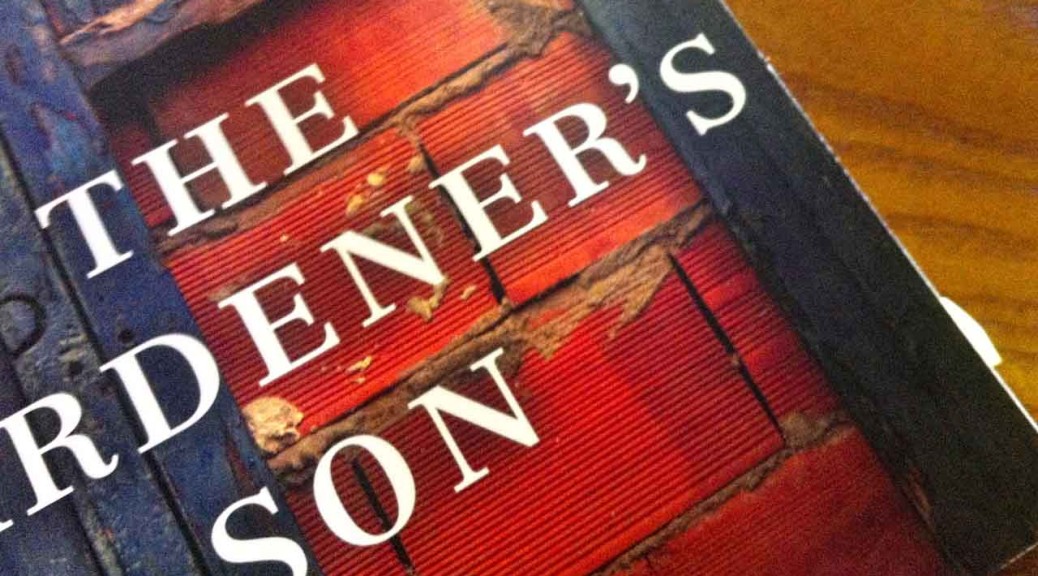
The Gardener’s Son
McCarthy, Cormac. The Gardener’s Son: a screenplay. New York: HarperCollins, 1996. Print.
“Whipper: They say that God sends no man a burden greater than what he can bear.
“Mr McEnvoy: Ay. Nor much less, neither.” p. 69
“There are always these strangers waiting for those who cannot set their house in order.” p. 73
“Once people are dead they’re not good nor bad. They’re just dead.” p. 94
Indiewire article on the TV film
Richard Pearce (director)
OCLC WorldCat The Gardener’s Son (TV film)
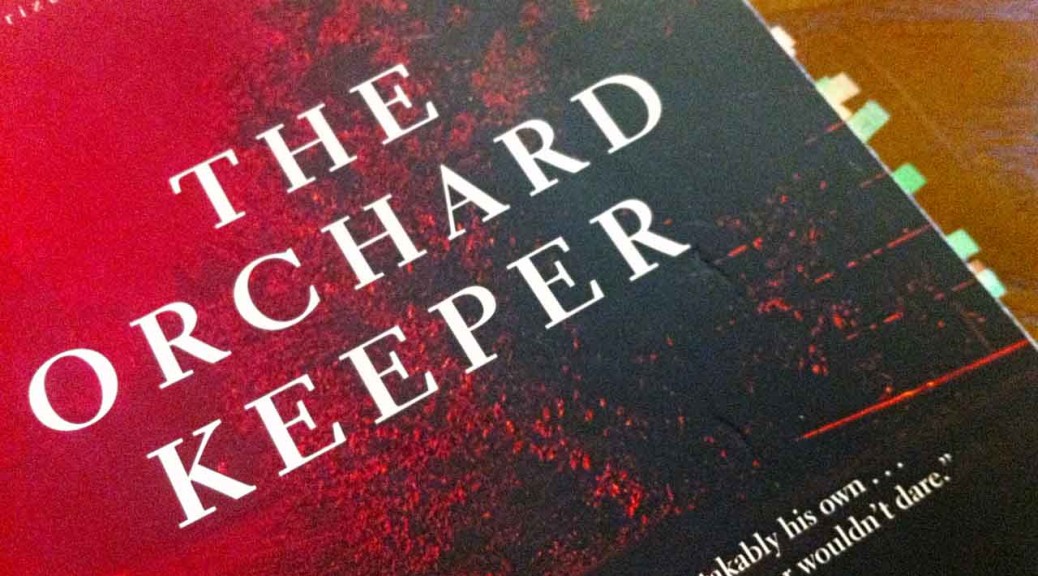
The Orchard Keeper (II)
McCarthy, Cormac. The Orchard Keeper. New York, N.Y.: Vintage International, 1993. Print. (First ed. 1965).
“Half blue tick and half walker.” p. 135
Talking about “being skeered of painters” 148-150.
Muskydine wine p. 150
“They sipped their wine with the solemnity of communicants, troglodytes gathered in some firelit cave. The lamp guttered in a draft of wind and their shadows, ponderous and bearlike upon the wall, weaved in unison.” p.150
“Old Bill, he backed off some, said that old she-painter might be around. Well, I was younger’n him and likely didn’t have as good sense, so in I goes and grabs the little feller up by the scruff of the neck.” p. 152
“And two days later the charred shaft of the pine tree still smoldering, pitch bubbling gently from the shell of the bark and small electricblue flames seeping and curling, the spire of smoke standing straight up in the motionless air like a continuation of the tree itself.” p. 163
“They began to unload, carrying the cases back into the garage, the car creaking and rising bit by bit until they had finished and it stood with its rear end high in the air like a cat in heat.” p. 165
“The old man watched them from his window darting and skulking among the bushes, slipping from tree to tree like boys playing Indians.” p. 185
“The old man sat very still on the floor. One shot struck the stove begind him and leaped off with an angry spang, taking the glass out of the table lamp. It was like being in a room full of invisible and malevolent spirits.” p. 186
“They went silently along over the trace of the quarry road, the sledge whispering, the gaunt dog padding, past the quarryhole with its vaporous green waters and into the woods again, the limestone white against the dark earth, a populace of monstrous slugs dormant in a carbon forest.” p. 189
“Well, Huffaker said, I couldn’t tell you offhand where-all you might find him at. He lives up yander somewheres–a random gesture at the brooding hills that cupped in the valley.” p. 196
“In the woods mists like old gray spirits paled and scattered, by moss coverlets the dark earth stirred and nightfurled wildflowers unbent their withered fronds all down the path where came the derelict hound shambling along in an aureole of its own incredibility,” p. 199
“Through a gap in the trees he could see the valley far below him where the river ran, a cauldron in the mountain’s shadow where smoke and spume seethed like the old disturbance of the earth erupting once again, black mist languidin the cuts and trenches as flowing lava and the palisades of rock rising in the high-shored rim beyond the valley,” p. 200-201
about the old man and his dog “proceeding on the weathered sun-washed bridge, jaunty and yet sad, like maimed soldiers returning.” p. 202
cat being prey to an owl 216-217
“When she left the rocks, was clear of the overreaching branches of the tree, there grew about her a shadow in the darkness like pooled ink spreading, a soft-hissing feathered sound which ceased even as she half turned, saw unbelieving the immense span of wings cupped downward, turned again, already squalling when the owl struck her back like a falling rock.” p. 217
“Cats is smart, allowed the old man. Course it could of been a common everyday housecat. They’ll tear up anything they come up on, a cat will. Housecats is smart too. Smarter’n a dog or a mule. Folks thinks they ain’t on account of you cain’t learn em nothin, but what it is is that they won’t learn nothin. They too smart.” p. 227
“The sun broke through the final shelf of clouds and bathed for a moment the dripping trees with blood, tinted the stones a diaphanous wash of color, as if the very air had gone to wine.” p. 246
“They are gone now. Fled, banished in death or exile, lost, undone. Over the land sun and wind still move to burn and sway the trees, the grasses. No avatar, no scion, no vestige of that people remains. On the lips of the strange race that now dwells there their names are myth, legend, dust.” p. 246

